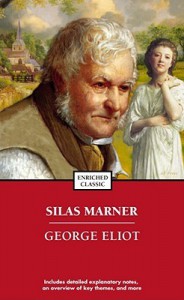Silas Marner (Enriched Classics (Pocket))
 Silas Marner is primarily a character study of its title protagonist, a weaver who lives completely alone in Raveloe village. Only his hoarded gold keeps him company and provides any joy in life. However, Marner's life and personality change when the gold is stolen and is replaced by something else.
Silas Marner is primarily a character study of its title protagonist, a weaver who lives completely alone in Raveloe village. Only his hoarded gold keeps him company and provides any joy in life. However, Marner's life and personality change when the gold is stolen and is replaced by something else. This is the very definition of a stodgy old classic. On the one hand, Silas Marner is well-written and demonstrates decent knowledge of human society, behavior, and motivation. Unfortunately, very little of consequence happens in the story, and none of the characters are particularly interesting, the title protagonist included. George Eliot is also fond of excessive philosophizing, with her observations being both dry and uninteresting, if plausible.
A major element of the story is the village of Raveloe itself. We are introduced to Squire Cass and his two sons, the Lammeter sisters, Ben and Dolly Winthrop, the elderly pastor Macey, and many others. Unfortunately, none of the characters are particularly interesting. Yes, they're all written realistically enough, but there's nothing special and engaging about any of them! They're simple village people, with few character quirks and boring lives.
The same is true of the action within the story. A few major events intersperse the drudgery of common description and exposition. All are depicted soberly and resolved without any particular intrigue or complications. Yes, Silas Marner reads like a realistic tale, for which I will give it credit; it's just one that lacks any bite.
I found myself comparing Silas Marner to the works of Charles Dickens, perhaps the most famous and celebrated of the Victorian era authors. Now, I hate Charles Dickens. Don't care for his works at all.
And certainly, Silas Marner is more cerebral and less melodramatic than Dickens's output, which is a positive. However, even the works of Dickens, as overloaded with excessive description as they are, present a more vivid and exciting world than the one that Eliot offers us with Raveloe. There is far more action, intrigue, and meaningful events that occur in Dickens's novel, even if his characters are less realistic and more melodramatically theatrical.
I also found myself comparing Silas Marner to one of the last books I read, Tarzan of the Apes. There is no question that George Eliot is many times the writer Edgar Rice Burroughs was. In fact, to compare the two is an insult to Eliot. And yet, I far prefer the work of the pulp fiction writer to that of the famous Victorian novelist.
While sometimes poorly written, Burroughs managed to present a colorful world full of adventure, unique characters, and secrets which cause intrigue and aren't discovered for long periods of time. Eliot, while writing it all very well, presents a drab and colorless world with no adventure, realistic yet simplistic characters, and secrets that are resolved in the soberest manner possible.
Yes, I realize Silas Marner is supposed to be a touching human drama about a man's love for his daughter and how it changes and enriches his life. Unfortunately, in such a dull world, it's hard to either empathize or connect with the narrative.
I would only recommend Silas Marner to serious fans of Victorian literature. I hear that even among Eliot's own work, Middlemarch is far livelier.


